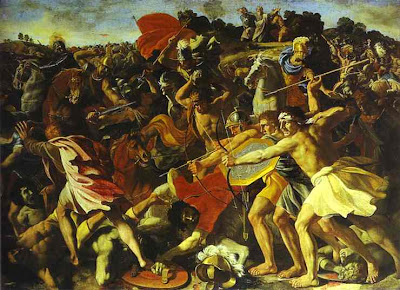Welcome back for the second half of the Double-Shot weekend of Michael Reads the Bible! It has been an excellent weekend here at Bible-reading headquarters; I hope you had a good one as well.
Joshua 15 - 21: A Thousand Words Are Worth a Map
With the conquest of the Promised Land essentially complete, Joshua begins a process of allocating the territory among the Israelite Tribes, and in many cases to the clans within the Tribes. The refuge cities are chosen, and the Levites, who are not to control a whole territory, are given towns from which to support themselves. It does not make for brisk reading. For each tribes, there is a verbal description of where the boundary of their territory runs, then a list of the towns and villages that lie within the boundary. It may well be that there is great symbolic or political significance to which tribes got what, but if so this is lost on me.
The Book of Joshua, which began as such an action spectacular, no longer seems at all cinematic. There is a brief narrative break in Chapter 15: Caleb's daughter's husband tells her to ask him for some good land, with springs. She rides her donkey over to her dad's place, and asks him. He says sure. That's it. That's the story. Kind of a letdown after the Battle of Jericho, don't you think?
The interesting detail in this section is that there are specific passages (15:63; 16:10; 17:10) that mention, as if in passing, cities or populations that the Israelites were not able to "dislodge," and who continue to live there after the Conquest. This little asterisk to God's promise to deliver the Promised Land in its entirety does not seem to be a cause of concern to the Israelites, but it is interesting to note that even Joshua's military juggernaut had its limits.
Joshua 22: East Meets West
With everybody slaughtered who is gonna be slaughtered, the tribes that elected to live east of the Jordan are free to go home. Tension erupts immediately, though, when the first thing they do is build a big altar on the east bank of the Jordan. This is a no-no, of course; Moses made it plentifully clear in Deuteronomy that all sacrificing was to be performed in one central location from now on, so the western tribes see this new alter as an unlawful branch office. They prepare for civil war.
Fortunately, cooler heads prevail and a delegation is sent to the Eastern tribes. "That's not an actual altar," explain the Eastern leaders, "it's a monument to the unity of the Israelites." They explain that they're afraid that future generations will come to see the Jordan as a natural divide, so they built the monument to remind everyone henceforth that Israelites on both sides of the Jordan share a commitment to the one altar of God, the one at the Tabernacle.
It's an interesting episode, with at least three interpretations:
- The Eastern Tribes really did put up the monument for that reason, and it was misinterpreted by the Western Tribes.
- The Eastern Tribes set up their own altar, then did some very fast talking when they saw that the more numerous Western Tribes had noticed and were willing to rectify their theological error by the sword.
- The Eastern Tribes set up their own altar, but leaders of the Western Tribes convinced them of the error of their ways in a smoke-filled hut; the monument story mutually agreed on as the official story, as a face-saving measure for the Easterners.
Joshua 23-24: Joshua's Farewell Speech
Joshua, who was leading the Israelites into battle as long ago as Exodus 17, was no spring chicken at the beginning of the Conquest of the Promised Land. It is not clear how long the conquest takes -- it could be two months or thirty years, from all I can tell -- but by the end of the process he is old, tired, and ready to die. In Joshua 23, he makes a short and graceful farewell speech, exhorting the people to obey the laws of Moses and to stay true to God.
Joshua 24: 2-13 is interesting; it's pretty much a quick synopsis of the first six books of the Bible (I could have spared myself the effort!), as Joshua reminds his people of their history. Verse 13 makes clear why, after Jericho and Ai, the Israelites stopped burning the cities after they butchered the inhabitants:
So [God] gave you a land on which you did not toil and cities you did not build; and you live in them and eat from vineyards and olive groves that you did not plant.
Joshua leads the people through a ritual of re-dedication to God, calling them to witness to their own commitment, and setting up a large monument stone as a witness as well. The chapter and book ends with Joshua's death and burial; the apparently near-simultaneous death of Eleazar the priest, of whom we have heard very little since Numbers, if memory serves, is mentioned almost in postscript.
And that's the Book of Joshua! I read it in just three sessions over 10 days, very much a land-speed record for this blog. It is short enough not to not a synopsis, so we'll just keep rolling into:
Next Week: Judges, baby!





